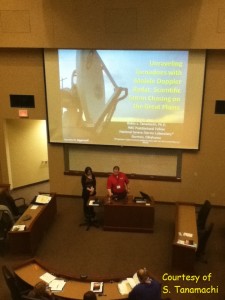It’s been a busy month! Immediately after the VORTEX2 science workshop, I traveled north to deliver a keynote talk at the 7th Annual Minnesota Skywarn Workshop. What a difference 15 degrees of latitude makes! Minnesota greeted me with a refrigerator chill. I reverted from a summer dress I wore in Texas back to a winter coat and gloves. No great surprise there – when I was growing up in St. Paul, I remember slushing it to the bus stop as late as the first week of May in some years.
The workshop’s organizer, John Wetter (Skywarn coordinator at NWS Chanhassen) had contacted me about a month earlier to ask if I would be interested in speaking. I jumped at the chance to reconnect with the weather community in Minnesota. And yes, I’ll admit to wanting to visit home for myriad personal reasons. They got a keynote speaker, and I got a trip back home. It was a win-win.

The workshop featured a nicely balanced cross-section of stakeholders: professional meteorologists (mostly op-mets from the NWS-Chanhassen and Duluth offices), EMs, members of the media, and educators. The audience members ranged widely in age, and all were keenly interested in all the talks. For my part, I spoke about the use of mobile radar in scientific storm chasing, and how it was about more than just pretty-looking data. I covered topics like dual-Doppler, EnKF, and GBVTD analyses, and of course, fresh results straight outta da VORTEX science workshop from which I’d just come. I worked in some networking between sessions. Near the end of the day, the speakers participated in a panel about social media and other factors influencing the future of Skywarn. I was impressed with the workshop organization; everything went smoothly as silk.
My talk was sourced mostly from my own work, but also from a large number of contributors. Here I credit several people who sent me slides, including Howie Bluestein, Jeff Snyder, Jana Houser, Mike French, and Vivek Mahale. I also knew I needed to include some mobile radar data collected in Minnesota in order make the talk locally relevant. (Our observations tend to be Great Plains-centric, just because of fuel costs.) Mike Biggerstaff, Gordon Carrie, and Kyle Pennington generously shared their results from SMART-R observations of the 17 June 2010 Albert Lea, MN tornado (collected during the VORTEX2 “epilogue” period). Thanks, guys!
The organizers were even kind enough to waive the registration fees for a few of my family members, so they got to enjoy the day’s program and learn useful skills like dual-pol radar interpretation. I’m particularly glad my uncle (former EM for Winona County) and aunt made the two-hour drive up to the University of St. Thomas, even though one of their horses was about to give birth. (Incidentally, the foal – a filly – was born the very next morning.)
I spent the balance of the weekend visiting friends and family. I returned to Norman both professionally and personally satisfied. Thanks, John Wetter, for giving me the opportunity to speak at this well-run venue and make a long-overdue visit home!